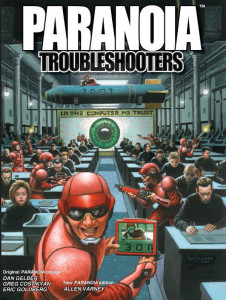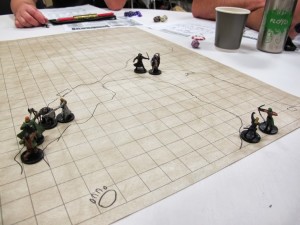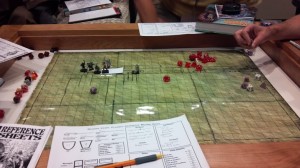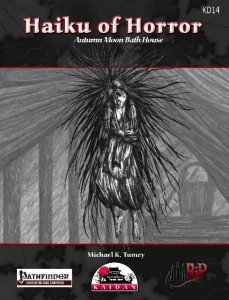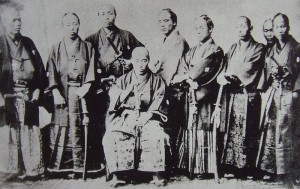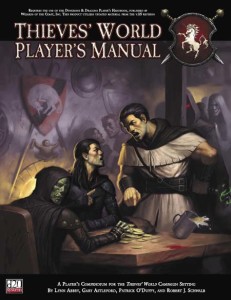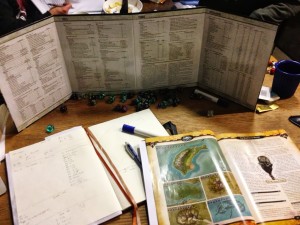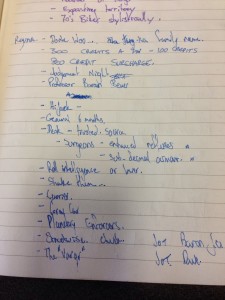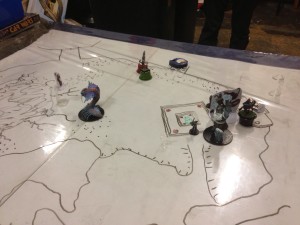No, I am not trying to introduce you to a drug dealer! Instead I am going to be taking a look at the Pathfinder classes one by one. It will be a theme that I return to irregularly at the Iron Tavern and so I have decided to do it in the time old tradition of alphabetically. I will cover all core rules base classes and then I may even go on to look at the prestige classes if it is a popular series. So without further ado, let me introduce you to Al Chemist.
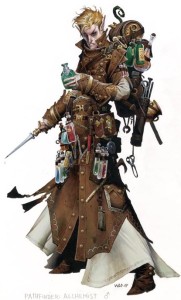 The Alchemist
The Alchemist
“I awoke one morning to the sound of flame and explosion. Looking up I saw Seroquel literally grinding the eye of newt into a paste so he could add it to his boom boom juice. I have no idea what that is and I dislike the Gnome in his original form so I told him to wake me when he let Hank out to play.” Excerpt from Gelik Aberwhinge’s journal, Saventh-Yhi, Mwangi Expanse.
First introduced in the Advanced Players Guide the Alchemist class fills the needs of all those people who have a little mad scientist in them. They are a quasi-magical class with a range of abilities that can shape the character in a variety of different configurations. I have had the pleasure of being the GM to two Alchemist’s so far and I have to say that they are a fun class inclusion in a party. Both players though took the same path so I have seen only one configuration of the Alchemist played out and that is the feral or Mr Hyde variant.
The Alchemist class relies on infusions that are brewed every morning. Much like a mad scientist they must follow a group of formulae from a formula book and have the ability (or skill) to infuse a certain number of extracts per day. These operate essentially by applying or drinking the extract and using the body as a conduit for the alchemical reaction. The effect is like that of a spell, and in fact uses standard spells as the description for these extracts. The spell list for the class is pretty good but the spells are mainly those that operate on the individual themselves. You will see no overt ranged attack spells like magic missile or fireball amongst the allowable spells due to this fact. Also, all actions to “cast” these spells draw an attack of opportunity i.e. draw vial from backpack: move action that attracts attack of opportunity; drink extract: standard action that draws an attack of opportunity. With this in mind it pays to remain out of melee range if you are intending on making your spells the main focus of the class.
But spells are but one part of the Alchemist’s many stringed bow. The class also receives the ability to create a number of explosive devices, or “bombs” that are ranged attack grenades if you wish to think of them that way. The Alchemist creates a two part infusion, both inert unless mixed and are the only class that can mix these reagents together. These bombs are super effective against individual foes and also have a splash damage to those surrounding the target. They also gain in effectiveness with the more class levels the Alchemist obtains, adding more and more damage. They start as a base of fire damage but through the use of discoveries the Alchemist can actually vary the energy type when they make the bombs.
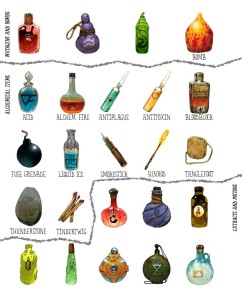 The discoveries that an Alchemist can make along the way may vary a lot about the class and it is through these discoveries that you can customise the character to a theme. As I stated in the introduction the two Alchemists I have GMed were of the type that followed a Dr Jekyll and Mr Hyde configuration. Mild mannered scientist who, upon drinking a mixture (called a mutagen) became a mighty fighter full of rage. The other stream of customisation actually takes the character more down the road of an expert bomber or demolitionist. It gives them a wide range of different energy types, delay explosions, smoke bombs and a bunch of other types. Some of these discoveries can only be taken at certain levels so there is a good range of powered abilities that the character can access through their career.
The discoveries that an Alchemist can make along the way may vary a lot about the class and it is through these discoveries that you can customise the character to a theme. As I stated in the introduction the two Alchemists I have GMed were of the type that followed a Dr Jekyll and Mr Hyde configuration. Mild mannered scientist who, upon drinking a mixture (called a mutagen) became a mighty fighter full of rage. The other stream of customisation actually takes the character more down the road of an expert bomber or demolitionist. It gives them a wide range of different energy types, delay explosions, smoke bombs and a bunch of other types. Some of these discoveries can only be taken at certain levels so there is a good range of powered abilities that the character can access through their career.
The second to last of the mad scientist abilities is the mutagen power. The mutagen is a concoction that the Alchemist can only make one of a day. When they make it they pick a physical statistic (strength, dexterity or constitution) that it will affect. Once the Alchemist drinks the mutagen they receive a +2 to natural armour as their skin hardens and a +4 to the ability that was chosen. The downside is one of the mental attributes (intelligence, willpower or charisma) takes a -2 hit. the choice is dependent on the statistic chosen to boost. It is like the Alchemist becomes a new, more feral version, of themselves and some Alchemists actually see it as a new personality and give them a name (as in the flavour text that headed this blog). The mutagen lasts for ten minutes per class level and can be an absolute life saver!
The last ability allows the Alchemist to use poison which in my opinion is not often used unless taking poison bombs. One of the Alchemist players I have GMed collected a lot of poisons but never really used them as it is a power quickly outclassed by many of the other special abilities that they pick up along the way. This power seems to be “tacked on” somehow and I am yet to see it truly benefit the class in play.
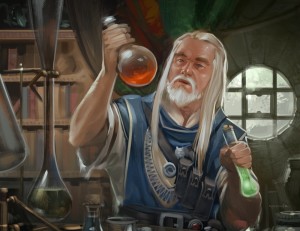 Ultimate Combat expands the Alchemist by providing new discoveries for the class, largely in the bombing area. It also provides two archetypes in the Beastmorph and the Ragechemist. Both of these classes target the mutagen powers to provide different abilities. The Beastmorph takes on animal features as they mutagen and some powers along with it. The Ragechemist is a Strength focussed class that creates a very angry alchemist indeed! Ultimate Magic provides a lot more discoveries with a much broader range from any of the previous rules sources. They do not just focus on bombs but on abnormalities too like vestigial limbs and a great variety of different powers that need to be investigated when playing the class. The book also provides no less than eight new archetypes that I will list but not go into. The archetypes are Chirirgeon, Clone Master, Internal Alchemist, Mindchemist, Peservationist, Psychonaut, Reanimator and the Vivisectionist. Needless to say, Ultimate Magic is a go to if considering playing this class.
Ultimate Combat expands the Alchemist by providing new discoveries for the class, largely in the bombing area. It also provides two archetypes in the Beastmorph and the Ragechemist. Both of these classes target the mutagen powers to provide different abilities. The Beastmorph takes on animal features as they mutagen and some powers along with it. The Ragechemist is a Strength focussed class that creates a very angry alchemist indeed! Ultimate Magic provides a lot more discoveries with a much broader range from any of the previous rules sources. They do not just focus on bombs but on abnormalities too like vestigial limbs and a great variety of different powers that need to be investigated when playing the class. The book also provides no less than eight new archetypes that I will list but not go into. The archetypes are Chirirgeon, Clone Master, Internal Alchemist, Mindchemist, Peservationist, Psychonaut, Reanimator and the Vivisectionist. Needless to say, Ultimate Magic is a go to if considering playing this class.
The Alchemist is on a whole one of my absolute favourite classes. They are quirky, scientific and utterly weird which is exactly why I like them. I strongly suggest you look at the Alchemist if you are considering wanting to play a spellcaster as they really are an alternative to the arcane type spellcasters you can get. The opportunity for colourful role playing of this class is excellent and they will be embarrassing and weird, creating all kinds of fun in a group of bold adventurers. I would rate the Alchemist at 9.5 steaming beakers out of 10 for an enjoyable class to play in Pathfinder.
Mark Knights is 39 year old guy living in a small rural town called Elliott in Tasmania, Australia. I have been role playing since I was 11 years old playing the original versions of Dungeons and Dragons, MERP, Elric, Dragon Warriors and the like amongst other genre games. I played D&D 2nd Edition through the 90′s but I ran Earthdawn for my fantasy setting and loved it as a GM. When 3rd Edition came out for D&D I tried it but found it too heavy on rules. I ignored the 3.5 edition of DnD in favour of Earthdawn (big mistake) as I thought it was just a money spinner. When 4th Edition DnD came on my players and I gave it a red hot go but hated what it had dumbed the game down to be. On a trip to Melbourne to buy some 4E stuff from a hobby store an old mate of mine pointed me at Pathfinder and in a Fantasy setting I have never looked back.


